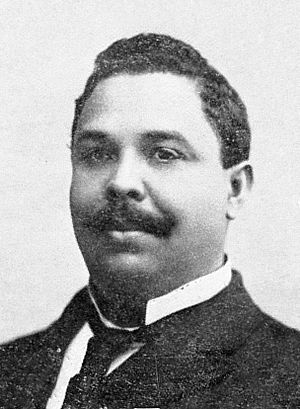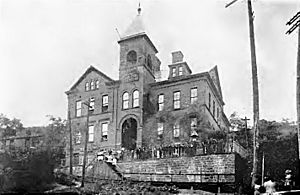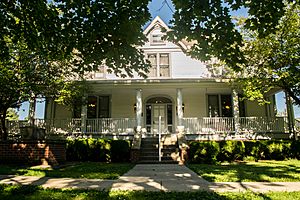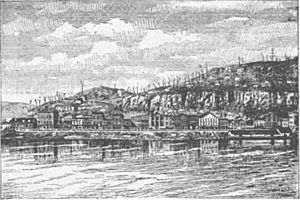James McHenry Jones facts for kids
Quick facts for kids
James McHenry Jones
|
|
|---|---|

Portrait of Jones ca. 1903
|
|
| 3rd President of West Virginia State University |
|
| In office 1898–1909 |
|
| Preceded by | John H. Hill |
| Succeeded by | Byrd Prillerman |
| Principal of Lincoln School | |
| In office 1882–1898 |
|
| Preceded by | Mrs. Gaskins |
| Succeeded by | Flem B. Jones |
| Personal details | |
| Born | August 28, 1859 Gallipolis, Ohio, U.S. |
| Died | September 22, 1909 (aged 50) Institute, West Virginia, U.S. |
| Resting place | Cabell Cemetery, Institute |
| Spouses | Carrie M. Harrison Elizabeth Moore |
| Profession | Educator, school administrator, businessperson, and minister |
James McHenry Jones (born August 28, 1859 – died September 22, 1909) was an important American educator, school leader, and minister. He was the third principal of the West Virginia Colored Institute, which is now known as West Virginia State University. He led the school from 1898 until his death in 1909.
Jones was born in 1859 in Gallipolis, Ohio. He grew up in different towns in Ohio before his family settled in Pomeroy, Ohio. He went to Kerr's Run Colored School and then Pomeroy High School, where he graduated with top honors in 1882. At 17, he became a minister in the Free Will Baptist church.
He started his career in education as a teacher. In 1882, he became the principal of the Lincoln School in Wheeling, West Virginia. This was the first public school for African Americans in the United States. During his 16 years there, he made the school much better. He turned it into a high school, doubled its size, and rebuilt it after a fire.
In 1898, Jones became the principal of the West Virginia Colored Institute. He helped the school get more money and built new buildings. He also added new courses, like teacher training and military programs. Jones was also involved in business, helping to start an oil and gas company. He was also a leader in a group called the Grand United Order of Odd Fellows in America. Jones died in 1909, and a building at West Virginia State University, Jones Hall, is named after him.
Contents
Early Life and School Days
James McHenry Jones was born on August 28, 1859, in Gallipolis, Ohio. His parents were Joseph and Temperance Reed Jones. He was one of ten children. His parents believed that education was very important.
James grew up in different towns in Ohio, including Burlington and New Richmond. His family eventually settled in Pomeroy, Ohio, near the Ohio River. As a child, he learned how to be a cooper, which is someone who makes barrels. He worked at this job before and after school.
He went to Kerr's Run Colored School. At 16, he started teaching in schools in Meigs County, Ohio. Then, he was allowed to attend Pomeroy High School, which was an all-white school. He studied there for four years and graduated in 1882 as the top student in his class. He was the first African American to graduate from that school. At 17, he became a minister in the Free Will Baptist church, serving churches in Pomeroy and Middleport, Ohio.
Career in Education
Leading Lincoln School
Before he even graduated from high school, James Jones was chosen to be the principal of Lincoln School in Wheeling, West Virginia. This happened on April 6, 1882. He was chosen over six other people who wanted the job.
Lincoln School was very important because it was the first public school for African Americans in the United States. It was started in 1866 after the American Civil War. Jones began his work as principal in June 1882. The school grew quickly, and he hired more teachers, including Carrie M. Harrison, who later became his wife.

In 1884, Jones had the school building improved and added two new rooms. In 1885, Lincoln School students took part in the Wheeling City Public Schools' graduation ceremony for the first time. This was a big step because students from Lincoln School received their diplomas on the same stage as white students. This was one of the first integrated graduations in the South. However, later, schools went back to being separate.
In January 1893, a fire destroyed the Lincoln School building. Jones quickly found a temporary place for the school and led the effort to build a new one. The new building opened in April 1894. His successor, Flem B. Jones, called the new school a "monument" to James Jones's hard work.
Under Jones's leadership, Lincoln School added a high school department in 1896. This high school program was the same as the one offered at the white Wheeling High School. By 1897, the school had about 300 students. During his 16 years as principal, Lincoln School became one of the best African-American public schools in West Virginia. He doubled the number of teachers and students and greatly expanded what the school taught.
Leading West Virginia Colored Institute

On September 21, 1898, James Jones was chosen to be the principal of the West Virginia Colored Institute. This school was founded in 1891 to provide education in farming and mechanical skills for African Americans in West Virginia. When Jones became principal, he lived in East Hall, which became known as the "President's House."
During his time at the institute, Jones helped the school get more money from the government. He also expanded the campus by building new classrooms, dorms, and workshops. He added two new buildings and made big additions to two existing ones. The number of students also doubled while he was in charge.
Jones also added new programs to the school, such as teacher training and military training. Students spent half their time on regular school subjects and the other half learning trade and job skills. By 1904, the institute had six main departments and its largest number of students ever, with 185 enrolled. After Jones died in 1909, Byrd Prillerman took over as president of the institute.
Community and Social Work
James Jones became a very important person in West Virginia. He was active in African-American religious groups and social clubs. In Wheeling, he was involved with the Simpson Methodist Episcopal Church and helped it grow.
He was a strong supporter of African-American progress. He often gave speeches across West Virginia, highlighting the achievements of African Americans. He was known as a great speaker.
At 18, Jones joined the Grand United Order of Odd Fellows in America, which was a social club for African Americans. He quickly became a leader in this group. In 1897, he traveled to the United Kingdom to represent the American Odd Fellows at their annual meeting. In his speech there, Jones said that African Americans could reduce racism and gain acceptance by focusing on education and strong community values. In 1902, he became the Grand Master of the Grand United Order of Odd Fellows, serving for four years.
Jones also used his political connections to fight for equal rights for African Americans. He supported equal public services, like separate train cars for African Americans. Even though he was involved in politics, he never ran for public office himself.
Writing and Business
Jones was also an editor for an African-American newspaper in Charleston called The Advocate. In 1896, he wrote a novel called Hearts of Gold. This book tells the story of African-American leaders fighting against racism after the American Civil War. It shows their dedication to education and community groups.
Hearts of Gold was special because it was the first American novel to have a main character who was the child of a marriage between a white woman and an African-American man. Only a few copies of the book survived over the years, but it was republished in 2010.
In December 1902, Jones helped start the Wilgera Oil and Gas Company. This company was likely one of the first African American-owned fossil fuel companies in the United States. Jones served as a director for the company.
Honors and Passing
Wilberforce University gave James Jones an honorary Master of Arts degree to recognize his great work at the West Virginia Colored Institute. In 1908, he received another honorary degree, a Doctor of Literature, from Rust College.
Jones died on September 22, 1909, in Institute, West Virginia. He had been sick for about a year. Hundreds of people visited his body as it lay in state at the institute's Hazelwood Assembly Hall. His funeral was held in Charleston. Important people like the governor of West Virginia, William E. Glasscock, attended and spoke about Jones's dedication to helping others. Governor Glasscock said that Jones "was engaged in lifting up his fellow man." Jones was buried at Cabell Cemetery on the campus of West Virginia State.
In 1911, the Lincoln School Alumni Association placed a memorial plaque at the school to honor Jones. West Virginia State University named Jones Hall after him. This building was built in 1924 and was originally a training school. Today, Jones Hall houses the university's printing services and a center that promotes understanding among different groups of people.
Personal Life
Marriage and Family
On December 27, 1888, James Jones married Carrie M. Harrison. She was from Harmar, Marietta, Ohio. They were married until Carrie's death in 1893 and did not have any children. Later, Jones married Elizabeth Moore from Cincinnati. They were married until his death in 1909 and also did not have children. Both of his wives had been teachers hired by him at the schools he led.
 | Aaron Henry |
 | T. R. M. Howard |
 | Jesse Jackson |


